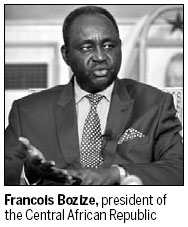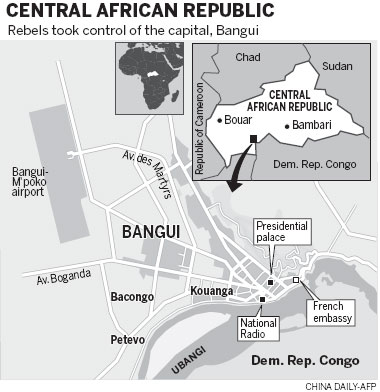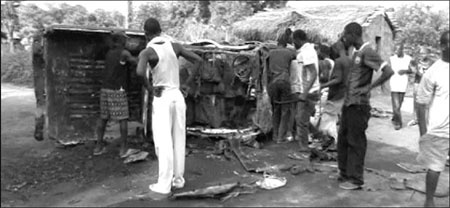Rebels seize capital, president flees
|
People gather around a burnt Seleka rebel truck in Begoua, 17 km from Central African Republic capital Bangui, on Saturday. Rebels in the Central African Republic seized control of the riverside capital Bangui after fierce fighting on Sunday. Reuters |

Rebels in the Central African Republic seized the riverside capital Bangui in fierce fighting, forcing President Francois Bozize to flee and sowing confusion over who rules the mineral-rich heart of Africa.
At least nine South African soldiers were killed trying to prevent the rebels taking Bangui, a Reuters witness said, dealing a blow to Pretoria's attempt to stabilize the chaotic central African nation and assert its influence in the region.
The Seleka rebel coalition resumed hostilities on Thursday in the former French colony and quickly swept south to Bangui with the aim of ousting Bozize, whom it accused of breaking a January peace deal to integrate its fighters into the army.
"We have taken the presidential palace," Eric Massi, a Seleka spokesman, said on Sunday.
Government officials confirmed the rebels had captured the city of more than 600,000 people, which lies on the banks of the Ubangi river bordering the Democratic Republic of Congo.
The violence is the latest in a series of rebel incursions, clashes and coups that have plagued the landlocked nation - which has rich, yet underexploited deposits of gold, diamonds and uranium - since independence from France in 1960.
Call for restraint
Meanwhile, French Foreign Minister Laurent Fabius confirmed on Sunday that Bozize had fled Bangui as the capital fell into rebel hands.
In a statement, the minister urged all parties to exercise the greatest restraint.
Fabius said the French embassy is keeping constant contact with "our compatriots" and "we asked them to stay home", adding that measures have been enforced to ensure their safety.
Bozize fled the presidential palace in Bangui 30 minutes before rebels began to zero in on the compound, his office said.
The announcement was made after a local human rights observation group reported that Bozize was seen en route to Mbaiki, 107 km south of Bangui.
Rebel pledge
In a separate development, a rebel leader in the country pledged to name a power-sharing government after seizing Bangui, and declaring himself president, a spokesman said, in an attempt to defuse an international outcry over the coup.
The seizure of power by the Seleka rebel coalition was swiftly condemned by the United Nations and the African Union.
The United States, France and regional powerbroker Chad called on Seleka leader Michel Djotodia to respect the terms of a January power-sharing agreement signed in the Gabonese capital Libreville.
The agreement had created a government drawn from rebel leaders, the civilian opposition and loyalists of Bozize. It was led by Prime Minister Nicolas Tiangaye, a former lawyer and member of the civilian opposition.
"We will respect the Libreville accord: a political transition of two to three years before elections," Massi said. "The current prime minister remains in place and the cabinet will be slightly reshuffled."
Massi said Bangui was calm on Monday morning, though Seleka was still seeking to contain sporadic looting which broke out on Sunday after Bozize's fall.
Seleka is a loose coalition of five rebel groups whose name means "alliance" in the Songo language.
Bozize rose to prominence during the rule of former dictator Jean-Bedel Bokassa, the self-styled Emperor Bokassa. Bozize's failure to deliver genuine power-sharing, followed by his re-election in disputed 2011 polls which the opposition boycotted over alleged fraud, led directly to the offensive by Seleka.
"The looting is bad. Both the population and Seleka are involved," said one senior UN official in Bangui. "We are not sure who is in charge. I don't think it is clear yet."
Reuters-Xinhua

(China Daily 03/26/2013 page11)















